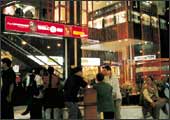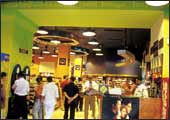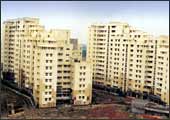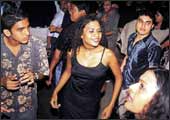|
 Time
was when time just was. It didn't move much. Not in Calcutta, anyway,
a city too devoted to intellectual rigour to do anything physically
dynamic. The cliches were true, of course. Cabbies knew big words
(like 'bourgeoisie'); raising prices was almost a capital offence;
and shopkeepers gave every paisa of change back-in slow motion.That
was then. The city is now called Kolkata, and its wallets are not
what they used to be. They are being thumbed open with far greater
frequency than any of those fat books on assorted struggles. Time
was when time just was. It didn't move much. Not in Calcutta, anyway,
a city too devoted to intellectual rigour to do anything physically
dynamic. The cliches were true, of course. Cabbies knew big words
(like 'bourgeoisie'); raising prices was almost a capital offence;
and shopkeepers gave every paisa of change back-in slow motion.That
was then. The city is now called Kolkata, and its wallets are not
what they used to be. They are being thumbed open with far greater
frequency than any of those fat books on assorted struggles.
It's the triumph of consumerism. Ask Randy
Shockley, Vice President (Marketing), Ford India. Bijay Bothra,
Ford's Kolkata dealer, tells him that the city is selling some 50
Ikons every month. If that's not enough to kill the stereotype of
the bank-stuffing scrounge, take a walk around the retail spaces.
And savour the jingle of cash registers. The city doesn't quite
compare with other metros on lifestyle indicators (See Indicator),
but it certainly doesn't want to be left behind any more.
Pizza Hut, for example, records an average
daily footfall of 700. "It's truly amazing," says master
chef Sanjeev Kapoor, who has opened his own restaurant Grain of
Salt in the same complex. "Never before had I thought it was
possible to do business of Rs 1.25 lakh-plus on a Saturday night
in Kolkata."
|
EXPLAINING THE BOOM
|
|
Attitude change: Sitting tight
on wallets is no longer the done thing; Kolkatans have turned
consumerist.
Business buzz: An entire generation
of small and medium enterprises is spewing money for quick
spending.
Savings fall: Falling interest
rates have hurt the incentive to save, which translates to
a new spend-happy existence.
Outsider traffic: The city is
attracting hinterland Bengalis, North Easterners and even
Bangladeshi shoppers.
|
Visit Incognito, Tantra of Park, Big Ben or
any other hangout, and watch. "For years," says Rahul
Saraf, 35, a builder, "we were told that nothing can be done
here because people are not willing to spend, and then came Pantaloons
with their store in Gariahat. We rediscovered the consumer."
Saraf wants to galvanise the city's retail scenario by putting up
modern malls and the like.
Almost every builder wants a piece of the action.
Ambuja group's Harsh Neotia and CMG Group's Sumit Dabriwala are
putting up two 100,000-sq-ft-plus malls in the city's Eastern suburbs.
"There has been a major attitude change in the city and its
people," observes Neotia, "The growth of the credit card
culture and people's aspirations are driving retail growth."
There's Life Outdoors
You wouldn't guess it, but Kolkata already boasts
Raymond's topselling store. MusicWorld, RPG Group's music store
chain, has also declared its Kolkata store the best performing in
India. Pantaloons, which opened its second city store last year,
notched up sales of Rs 21 crore in 2001-02, and is expecting at
least a 25 per cent jump this year. "Kolkata is definitely
a major opportunity for us," says Kishore Biyani, Managing
Director, Pantaloons. Other retail successes include Westside, a
Tata Enterprise, Landmark, an Emami group effort, and Charnock City,
the city's version of Selfridges.
A recent survey by Jones Lang LaSalle showed
that around 27 per cent of the Kolkatans spend around Rs 1,000 per
visit to a shopping mall and around 12 per cent spend upwards of
Rs 5,000-a major jump from four years ago. That was when Kolkatans
would balk at big restaurant bills. Now, Rs 800 on dinner-for-two
has become customary.
 |
The spending buzz...
Kolkata is turning into a shopper's haven,
malls, retail glam-set et al |
 |
...And the change of
beat
The city is moving to a new beat, less
conservative, more peppy |
 |
The rise of concrete...
Yuppie Kolkatans want to live the good
life, on home-loans if need be |
 |
...And the fall of inhibitions
Little black dresses, late night carousals,
it's all part of the transformation |
"Habits have undergone a sea change in
the last couple of years," explains Nilavo Thakur, the man
behind two of Kolkata's most sought-after restaurants, Red Hot Chilli
Pepper and Tangerine. "The salaried class, backed by the credit
card culture, is going out to eat." That the hotel industry
had a whiff of this is evident in the new projects coming up. Hyatt's
200-room hotel will be ready by year-end, followed by Welcomgroup's
latest. Five-star occupancy rates, says a Hyatt spokesperson, have
been rising in the last two years, while F&B sales are brisk.
But where is all this money coming from? Business.
That's right. You can feel it in the air. As conservatism begins
to lose appeal, the new Kolkata has begun acquiring a whole new
language, the businessman's language.
"There is a whole new generation of businesses
in the small and medium segment," elaborates Sudhir Jhunjhunwala,
owner of Dewar's Auto, a top car dealer, "and that forms the
bulwark of the city's wealth creation and spending. These guys are
buying big." Maruti's Alto and Zen, he says, have overtaken
sales of the old 800.
According to Amit Jalan, 35, a trading partner
of Airtel, "Many old business families recognised the potential
of branching out of their traditional business and picking up agencies
and the like. Today, this is being extended to real estate sector,
fashion, retail and related activities." And the cellphone
frenzy isn't stopping. "We are amazed at the growth rate. The
market must be growing at 20-25 per cent in this city," says
Deepak Gulati, Chief of Airtel's Kolkata operations.
A Shopper's Paradise?
There is, of course, a broader economic context
in which Kolkata's attitudes are changing. Interest rates are down,
and with it the incentive to save. As economist Amiya Bagchi expounds,
"West Bengal has traditionally led the country in small savings,
but with the falling bank rates, there is a decline in the growth
of savings. For the first time, this growth has gone down to well
below 10 per cent. Add to this the incentive of tax-saving by availing
various loan facilities, and the sum total is a generation of people
willing to spend rather than save."
Keynes, of course, would've approved.
Any analysis must also factor in West Bengal's
overall growth in agriculture and trading. A large proportion of
Kolkata's big spenders are visitors, and not just from the hinterland.
North-easterners are pouring in for shopping sprees, and so too
are Bangladeshi citizens, who started visiting Kolkata for medical
treatment but now see the city as a shopper's paradise. The tags
on foreign labels are lower than in Dhaka or Chittagong, says S.K.
Bhattacharya of Charnock City.
With a low cost-of-living index (Kolkata was
recently rated 72, with Delhi's 100 as the base, and Mumbai topping
at 125), the city is a good place to settle, too. Yet, Kolkata still
lacks the cosmopolitan work culture of a Delhi or Mumbai, which
requires local firms to attract talent from across the country.
Can Kolkata do it?
|
Business is buzzing. You can feel it in
the air. As conservatism wanes, the new Kolkata is acquiring
a whole new language-that of business
|
It's not impossible. A flat in upmarket Alipore
or Tollygunge can be bought for just about Rs 2,600 per-sq-ft, much
less than equivalents in Delhi or Mumbai. Better value-for-money
living is available too. An estimated Rs 250 crore is being invested
in upscale housing projects, swimming pools et al, much of it along
the eastern metro bypass. According to Dabriwala, the younger generation
simply wants higher living standards, and is willing to take loans
to buy themselves housing with modern lifestyle amenities.
Big investors are watching developments closely.
Sums up Sanjiv Goenka, Vice Chairman, RPG Enterprises, "Kolkata
has stopped being the backwaters and is emerging as a city of opportunities,
and even the government realises that and is creating concessions
for the services sector and especially the retail industry."
RPG is setting up a hypermarket on the city's eastern bypass.
Most investors have the city's 450,000-odd
'high income' households in mind. But the action is bound to have
a ripple effect. The bottomline is that this city of 12 million-plus,
with 3.5 million unemployed, doesn't want to brood over its problems
anymore. It would rather get out there and make the economy rock.
|

